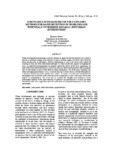| dc.description.abstract | Urban development and planning, at present, demand an approach that both provides an account of the forces leading to change in the qualities of places in urban regions and offers ideas about the forms and processes of governance. People’s participation is seen as one of the main element of ensuring socially just urban intervention although it is often misdirected, applied in inappropriate ways, or controlled and manipulated on purposes against the interest of the local communities. In most of the urban intervention process, policy decisions are often required quickly, with incomplete data or with limited resources with which to obtain information. One of the main challenges, the urban development practitioners’ faces, is how to find out, evaluate and use relevant information in a timetable dictated by events outside their control. To ensure a socially just intervention the investigators have a need for careful reflection on the enquiry process and a clear sense of their own purpose in undertaking it. This essay tries to ascertain the strengths and weaknesses of the participatory methods in the rapid definition of potentials and problems for a socially just urban intervention with some suggestions about the justification of using participatory process for urban intervention. | en_US |

